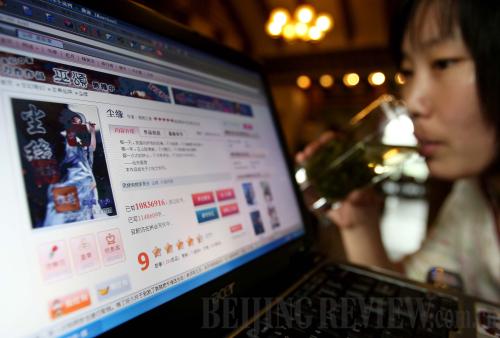|
 |
|
READING CONVENIENCE: Reading on the Internet, mobile phones or other electronic devices is a worldwide trend (CNSPHOTO) |
The popularity of digital reading is increasing exponentially worldwide. The digital movement has been widely accepted by a rising number of young people because, compared with traditional printed publications, digital devices are more search friendly and convenient to use or preserve at much lower costs, while boasting larger storage capacities.
Maverick post-1980s writer Han Han, for example, entrusted Qidian.com to serialize his latest novel, A Daydream, last December, more than one month before the official release of its printed edition. Qidian.com is one of the three literature websites operated by Shanda Literature.
Han's attempt was viewed as "providing an alternative for Chinese writers who have books to publish." Additionally, the online debut didn't affect sales for the printed edition. According to Hou, Shanda Literature hopes to attract other prominent writers to attempt online publishing through Han's example.
From May to August, Qidian.com held a writing competition, inviting thousands of Chinese netizens to complete their family trees and write stories about their heritage on the website.
"The Internet offers grassroots amateur writers opportunities to write, while readers decide whether they like the content or not," said Zhang Wei, who rose to fame by writing magic and fantasy fictions online under the pen name Tang Jia San Shao and is now a signed writer to Shanda Literature.
"If an author wants loyalty from his readers, he must be loyal to readers' needs first," Zhang said.
Digital writing, in this sense, is becoming more of a customer-oriented production, a method that has been a key component in the production of China's first interactive thumb novel—a story designed exclusively for reading on mobile phones.
We read, we decide
MOGA Girl is the name of the four-member writing team for the interactive and multi-plot thumb novel, I Read Your E-mail, a story about a 31-year-old unmarried workaholic who, successful but unloved, is given the chance to relive her life starting at age 16.
Shanda Literature initiated the series, which also serves as a marketing project for Nokia's new E63 model. Three writers within the team completed, respectively, three parallel plots of different styles. Readers could choose to read either the black plot where the woman, a realist, pursues her goals by all means, the red plot where the passionate heroine always puts realization of her dreams above any other pursuit, or the blue plot where the protagonist becomes a sensible woman of wisdom.
"This production focuses more on the readers' experience. With the three options, readers of varied temperament and personality can still find the plot development and ending they like," said Shanda Literature's Senior Manager of Marketing Zhao Yi.
The writers said they enjoyed this creative way of writing because the experience was different than projects they'd worked on before and allowed them to "have fun."
"We call it a team work because we first made it clear what our readers' tastes were, then decided the theme and format of the story, planned the main plot and structure of the story accordingly, and found the right author to tailor each of the three parallel plots," said team leader Zhong Xi. "The process completely reversed the traditional way of author-first literary creation."
| 